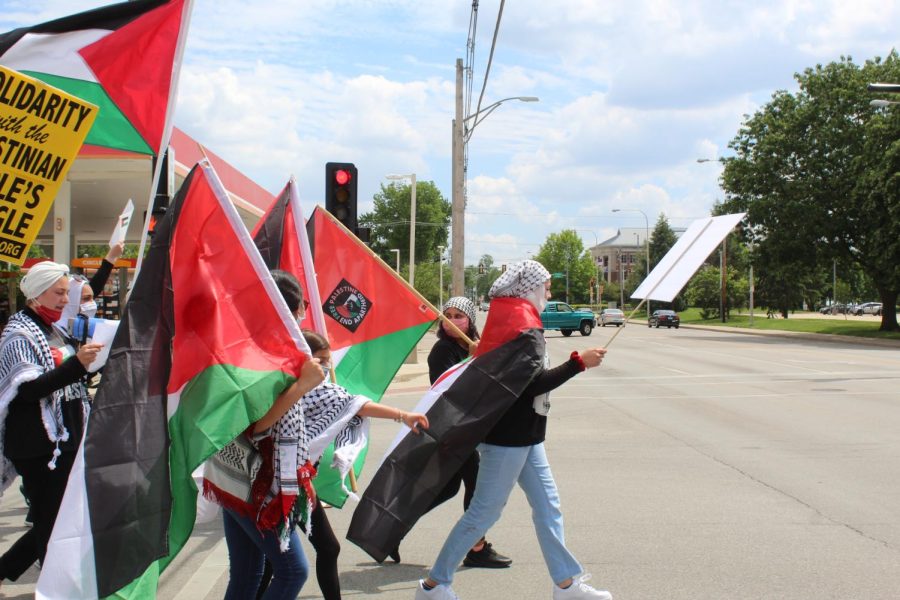A campus divided against itself
Palestinian students and alumni speak out about challenges their community has faced on campus.
Protesters march across Lincoln avenue during a Palestinian-rights demonstration on May 23, 2021. Pro-Palestinian protests erupted across the country in May, 2021, in response to increased violence between Israeli and Palestinian forces.
Nov 10, 2021
Last updated on Nov. 18, 2021 at 11:06 p.m.
Part Two: Palestinian Voices
This story is part of a project highlighting Jewish and Palestinian students at Illinois. Part one of the story, which focuses on Jewish institutions and individuals holding the University accountable for allegations of anti-Semitism, can be read here.
Small children hoisted up red, green and black flags taller than themselves while megaphones rang with heartfelt stories about the loss of family members and harassment by Israeli soldiers at checkpoints in Palestine.
Get The Daily Illini in your inbox!
One chant, repeated over and over, seemed to resonate with the crowd: “From the river to the sea, Palestine will be free.”
The protest, held in Champaign-Urbana on May 23, was organized after the news of bombings in Palestine spread throughout the world this past May. The group marched from downtown Urbana to the Main Quad. Palestinian organizers spoke outside of Foellinger Auditorium where they grieved the deaths of Palestinians and violence in Palestine.
Social media feeds were flooded with hashtags including #SaveSheikhJarrah and #FreePalestine. Images and videos of Palestinian children standing outside of crumbling buildings and Palestinians held in Israeli jails were displayed for weeks.
Seeing these videos and social media posts detailing the violence that was happening in Palestine was also happening during finals for students. Many Palestinian students said they were grieving alongside all Palestinians while trying to focus on their studies.
Pro-Palestinian protests were held across the country, including on the University’s campus.
But many Palestinian students at the University said this was one of the first times people in the United States without ties to Israel or Palestine were seeing what Palestinians had been talking about for decades.
“This has been going on since the 1960s, and it just keeps getting worse and worse,” said Jamiel Abed, a Palestinian student in Engineering. “It just so happens that in May it really caught people’s attention, but this never ends for the Palestinians.”
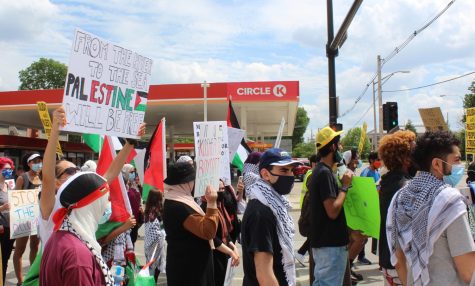
Zionism is an ideology, typically held by certain sects of Jewish people, that believes Jews are the rightful inhabitants of an Israeli state in the land between the Mediterranean Sea and the Eastern Bank of the Jordan River. Anti-Zionists believe that Palestinians, not just Jews, have a claim to the land contemporarily known as Israel.
The October 2020 complaint alleging anti-Semitism on the University’s campus, in addition to detailing swastikas found in University buildings, also included instances of anti-Zionist organizing on campus.
The complaint filed by students against the University claims that there is a culture of anti-Semitism on campus that has not been dealt with by the University’s administration— and also threatens the University’s federal funding.
Palestinian students on campus maintain that anti-Zionism and anti-Semitism are not synonymous. Many said that although the U.S. does have a problem with anti-Semitism, it’s not related to Palestine.
Many Palestinian students were not comfortable speaking about their experiences, often because of concerns that they will be labeled anti-Semitic for speaking out against Israel and its policies.
In addition, many Palestinian students echoed concerns that the University has an anti-Palestinian bias and does not uphold the rights of Palestinian students because of threats from Zionist institutions and alumni.
Although it can be difficult to speak with people who share different viewpoints from you, the University said many students are in the process of listening to others that they may not agree with.
A University spokesperson said they have had conversations with students who are both Zionist and anti-Zionist through their Campus Belonging Resources listening sessions.
“These conversations can be emotionally difficult for the students involved, and we appreciate the time and effort that students are making to hear one another’s perspectives.”
Campus Belonging Resources, which was created to replace the Bias Assessment and Response Team, allows students, faculty and staff to report any concerns that threaten their sense of belonging on campus.
Two listening sessions included Buthaina Hattab, current president of the University’s chapter of Students for Justice in Palestine. She says the non disciplinary aspect is better for students who may have a report filed against them.
“It makes for a much safer environment for students who are reported,” Hattab wrote in an email.
Hattab, a Palestinian student, said the rights of Palestinian students should be treated the same as the rights of other students. To her, their human rights are often separated in conversations.
“When you’re talking about human rights, that should be unconditional,” Hattab said. “If there’s an injustice somewhere, it should be an injustice to everyone.”
The following experiences are detailed recounts of individual students and alumni who have experienced challenges as a part of the University’s Palestinian community.
Sireen
Sireen’s last name has been omitted to protect her identity.
When Sireen moved to the United States from Palestine to go to high school, she said it was strange to see how Americans perceived Palestine and Palestinians.
At best, she said Palestinians were nonexistent to Americans. At worst, they were perceived as terrorists.
Even when filling out forms for her application to the University, Sireen said she had to check the race box as “white” — an identifier she doesn’t identify with.
According to her University admission forms, Sireen is from the “Palestinian territories.” However, Sireen said she’s from Palestine.
The term “Palestinian territories,” widely used throughout the world, refers to the West Bank and the Gaza Strip. These two areas are widely disputed as to whether they should belong to Israel or Palestine.
Sireen said the University’s conflation of anti-Semitism and anti-Zionism is often the reason Palestinian students like her repeatedly feel like they’re not accepted on campus.
“At every corner, we’re reminded that we’re stateless and we belong nowhere,” Sireen said “And that’s what the University perpetuates by not creating space for us.”
The University said they are in the process of including more options for students to identify as on official forms.
“We have also heard that students, faculty and staff would like better options when they are asked to self-identify on forms and surveys,” the University wrote. “Because they are not able to identify themselves as Middle Eastern or North African in demographic surveys, many of those students feel invisible on campus and report that their concerns go unheard.”
While living in Palestine, Sireen said violence became normalized. Sireen said it wasn’t out of the ordinary to wake up and find out your neighbor was taken in the middle of the night by the Israeli Defense Force.
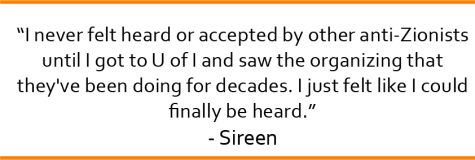
Sireen said the IDF controlled almost every aspect of her freedom as a resident of the West Bank, a disputed territory under Israeli occupation. In order to enter Israeli cities, she said it was always a toss-up whether or not she and her family would be allowed to go through the checkpoint.
While waiting at the checkpoint, Sireen said she felt the same way every time.
“It honestly feels like you’re cattle left out for slaughter,” she said. “Because everyone is packed together in the heat without any air conditioning, and you go to the checkpoint not knowing whether or not you’re even going to be allowed through.”
Coming to the University, Sireen said it was the first time she felt like she could be herself and speak up for her home country.
“I never felt heard or accepted by other anti-Zionists until I got to the University and saw the organizing that they’ve been doing for decades,” Sireen said. “I just felt like I could finally be heard.”
However, Sireen said she still had concerns about speaking out against Israel and Zionism. She said one of her biggest concerns is Canary Mission — a website that documents “people and groups that promote hatred of the USA, Israel and Jews.”
Canary Mission creates profiles for anti-Zionist organizers, often college students, including links to their personal social media accounts, affiliations with the Students for Justice in Palestine and BDS and photos taken from social media and school profiles.
Many Palestinian students echoed her concerns saying that if the IDF found their names on Canary Mission, they could be rejected from travel checkpoints and graduate schools.
“It genuinely prevents us from getting into the jobs or grad schools we want,” Sireen wrote in a text message. “Being targeted by these websites even makes us unsafe when we go back home to Palestine.”
To avoid possible danger and conflict from having a profile created on Canary Mission, Sireen’s last name is not included in this piece.
While in classes at the University, Sireen said she’s often worried about revealing her identity as a Palestinian student because of possible bias.
“I wouldn’t know possibly if my professors are Zionist,” she said. “And if they know that I’m Palestinian and I stand for Palestinian Liberation, will they be biased against me?”
Although Sireen said her home in the United States had a fairly large Palestinian population, she said she never felt truly heard by anti-Zionists in America.
She said she finally found her voice in Palestinian activism when she came to the University and found other students who were passionate about Palestinian rights. To her, the organizing happening on campus echoed her frustrations about what was happening to the land she was born and raised on.
“I just felt like I could finally be heard,” Sireen said.
Abed
At 2:16 a.m. in the middle of finals week last May, Jamiel Abed, now a senior in Engineering, sat in his University dorm room.
Instead of studying for the finals he had that week, Abed was recording a YouTube video.
In May, social media was filled with posts tagged with #SaveSheikhJarrah and #FreePalestine. With over 200 subscribers, Abed creates videos centered around topics like vlogs, sports and Palestine.
While the media was reporting on widespread chaos and conflict in Palestine, Abed was on campus trying to focus on finals. Instead, he said making a video detailing what was happening in Sheikh Jarrah was more important.
“There are things more important in life than the final I have on Thursday and the final I have on Friday,” Abed said in his video. “There really are.”
In addition to viewing images of suffering Palestinians and collapsed buildings online, it was also Ramadan for Muslim people throughout the world.
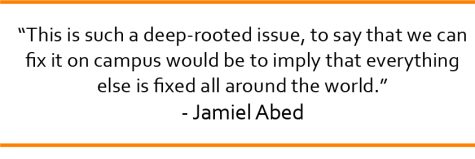
Abed said it was a difficult time for all Palestinian students on campus, and in response, he said the University did nothing to support them.
Abed said the University is too scared to speak up for Palestinian students on campus because of the interests of Zionist donors.
“The power dynamics don’t just live in Palestine,” Abed said. “They’re everywhere – even on our own campus.”
Because of his anti-Zionist and pro-Palestinian activism, Abed said he is worried his work will be conflated with anti-Semitism.
Although anti-Zionism and anti-Semitism are often conflated, Abed said the conflation is a tactic to silence Palestinian people.
“My people had their whole village raided last week, and no one sees anything wrong with it,” Abed said. “And if I want to point it out that it’s wrong, then I’m (called) anti-Semitic.”
Abed said that although anti-Semitism is real and happening on campus, he said he doesn’t believe anti-Zionism should be categorized as anti-Semitism.
“This is such a deep-rooted issue, to say that we can fix it on campus would be to imply that everything else is fixed all around the world.”
Hattab
Buthaina Hattab, senior in LAS, had been going to Palestine with her family for years.
However, on her most recent trip, she went with a group of younger Palestinians like herself.
Hattab said that on this trip she wanted to see more of Palestine instead of staying in the same village with her family.
Once she got to the border by the West Bank in between Jordan, Hattab said she was faced with questioning from IDF soldiers and images of Palestinians living in refugee camps.
“It was just very jarring to me,” Hattab said.
When she was traveling with the group, she said there was one member of the group who only spoke Arabic. Although she said she was hesitant to speak with him because she only speaks limited Arabic, she tried to make basic conversation.
After asking about his family, she found out that he had three brothers. Once she asked about not having a sister, he revealed that his sister had been killed by Israeli soldiers on her way to school.
“This little girl — she’s not gonna grow up to get married and have kids and get her college degree,” Hattab said. “And it’s at the expense of the Israeli military.”
Later that night, Hattab said her tour guide told her to avoid speaking with people who have lived in Palestine their whole life about their family.
“More times than not, every Palestinian family has had something happen to them by the Israeli occupation,” Hattab said. “They might have a family member in jail, a family member killed. You don’t know.”
After seeing the personal effects of the Israeli occupation, Hattab said she felt even more connected to the movement for Palestinian movement.
“It’s easy to detach from it and be like, ‘Oh, these are just numbers,’” Hattab said. “But to go to Palestine and to see them and talk to them and see the human toll it takes — it’s just something completely different.”
When the complaint alleging widespread anti-Semitism on the University’s campus was filed last fall, Hattab said that seeing her anti-Zionist organizing next to instances of swastikas was degrading.
Hattab co-authored a BDS resolution in February of 2020, which although was passed by the Student Senate, was met with opposition from University administration.
BDS is a pro-Palestinian rights movement that relies on economic pressure by advocating for boycotts, divestments and economic sanctions against Israel.
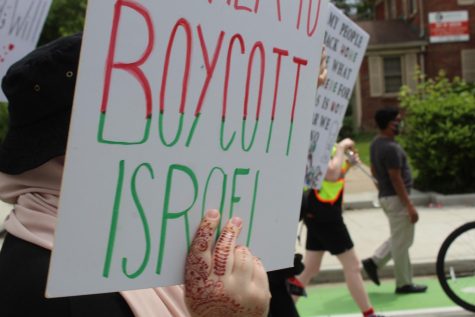
However, Hattab said when she was drafting the resolution, she was hesitant to put her name on it because of Canary Mission and the risk it could have on her future education and employment opportunities.
“I almost wasn’t going to put my name on it,” Hattab said. “I drafted most of it and I knew it was going to be controversial and cause a lot of stuff and I just didn’t want my name on it.”
Hattab also co-authored a second resolution in September of 2020, which was also met with pushback from many Jewish students and University administrators including Chancellor Robert J. Jones, Provost Andreas Cangellaris and four other vice chancellors.
“As soon as those resolutions were published, (the University) came out and said they’re non-binding and they won’t do anything about it,” Hattab said.
Hattab said it was frustrating to have her hard work on resolutions that mean a lot to her demeaned and delegitimized by the University.
When asked about any possibility of a relationship with Zionists and anti-Zionists on campus, Hattab said she doesn’t have any interest in pursuing one.
“Asking that question is like asking someone that was abused to be friends with their abuser,” Hattab said. “When people fail to see your humanity in what you advocate for, there’s no relationship to be had there.”
Sinnokrot
On Quad Day, the University’s annual event displaying clubs and activities for students to join, one freshman knew exactly which RSO she wanted to join.
Sofia Sinnokrot, now a University alumna, said she knew Students for Justice in Palestine would be part of her time at the University.
But before college, her father told her not to get involved in Palestinian organizing because it could compromise her ability to get a job in the future. If she had a profile made on Canary Mission, Sinnokrot said it was possible to be rejected from employers who could be Zionist.
But Sinnokrot decided to join SJP anyway.
“As I grew up and throughout college, I realized that I wouldn’t want to work for an organization or do something with my life that I have to compromise on my morals for,” Sinnokrot said.
As a Palestinian student, Sinnokrot said SJP allowed her to explore her interest in organizing for Palestinian rights. But even when she got involved, she said ending up on Canary Mission was still a huge fear for her.
Although all of the consequences of getting a profile made on Canary Mission were concerning for her, Sinnokrot said not being able to get through Israeli checkpoints in Palestine would carry the most weight.
“My biggest fear is not getting back into Palestine and being able to see my family again,” Sinnokrot said.
As someone who is interested in working for political organizations in support of Palestinian liberation, Sinnokrot said her Canary Mission profile lists all of the organizing she’s done throughout her life.
Now, Sinnokrot said her Canary Mission profile could give potential employers an entire list of her Palestinian rights organizing.
“I’m almost tempted to just send them the link to my Canary Mission because it details out almost all of the work I’ve done for Palestine,” Sinnokrot said. “So it’s funny how things switch around in that sense.”
Sinnokrot said when she was a student at the University, she observed a large disparity of resources between Jewish and Palestinian students. She said SJP met inside her apartment instead of a designated space inside a campus building.
“We all considered my apartment the SJP headquarters because that’s the only place that we could meet,” Sinnokrot said.
The more that she got comfortable using her voice to bring light to the struggle for Palestinian liberation, Sinnokrot said the more comfortable her family got as well.
“(My dad) will still make comments here and there, but then at the same time, he’ll send pictures of me at protests to his friends and family,” Sinnokrot.
“At the end of the day, he’s actually like, proud of all the work I’ve done.”
Now, Sinnokrot said her Palestinian identity is more integral to her than ever before.
“I’m your friend, but at the same time, like, I’m Palestinian, and to me, being Palestinian comes first,” Sinnokrot said. “And that’s something I’m holding close to me now.”
Ghanimah
Dunia Ghanimah, now a University alumna, said she was beyond excited to be a Multicultural Advocate for University Housing.
Multicultural Advocates, or MA’s, were created almost two decades ago to serve as cultural resources for University residence halls and educate residents on social justice issues.
As a Palestinian student and activist on campus, Ghanimah said she had a reputation for being the “Palestine girl.” But Ghanimah said she was good at her job, especially getting residents to come to various social justice presentations throughout the school year.
That’s why in the fall of 2019, Ghanimah decided to present a social justice discussion about Palestine called “Palestine and the Great Return March: Palestinian Resistance to 70 Years of Israeli Terror.”
Despite a seemingly positive reaction from the residents she gave the presentation to, the presentation was soon flagged for containing anti-Semitic content.
Ghanimah maintains that the presentation was not anti-Semitic.
In the past, she had given presentations on different social justice movements including Black and LGBTQ+ liberation. However, Ghanimah said she was silenced when she spoke about her own culture’s struggle for liberation.
“I could talk about everybody’s plight and struggle, but I couldn’t talk about my own,” Ghanimah said.
Ghanimah said that by the end of her presentation, people were crying because it contained so much about her own experiences around her Palestinian identity.
“It’s not just facts,” Ghanimah said. “It’s literally my lived experience too.”
Ghanimah has had many experiences with Israel, from being forced to strip naked in front of IDF soldiers at an Israeli checkpoint to hearing that her 14-year-old cousin was killed by the IDF while attending a protest in Palestine.
Although she said she expects persecution as a Palestinian woman, she also thought the University would protect her from being labeled anti-Semitic.
Instead, Ghanimah said the University was more concerned with protecting donor money from Zionist alumni.
“They’ll throw any group of people under the bus for that donor money,” Ghanimah said.
Even when meeting with Chancellor Jones, Ghanimah said he never explicitly agreed with people who filed the complaint that the presentation was anti-Semitic. Instead, Ghanimah said Jones said the presentation was “interpreted that way.”
After the Massmail condemning her presentation was sent out to the entire campus community, Ghanimah said that she started receiving physical and online threats.
“People were literally sending me like things that were saying, ‘I’ll rape you if you don’t go through with that resolution’ or like, ‘This is your dorm number,’” Ghanimah said.
Ghanimah said people even got a hold of her mom’s number through her emergency contact and called her, threatening to kill her daughter.
She said she was even physically threatened inside a University building. Ghanimah said a Jewish student pushed her against the wall of an elevator in a Engineering building and told her to ‘Watch out.’”
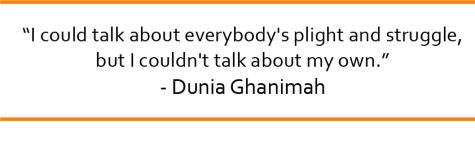
Despite documenting all of the harassment she faced on campus including sending screenshots to the Chancellor and his office, Ghanimah said the school did nothing to protect her.
“I reported it to the University of Illinois Police Department and the Bias Assessment and Response Team,” Ghanimah said. “They have it on camera, and they didn’t do anything to him. He graduated fine.”
Many students, both Jewish and Palestinian, have said they received no follow-up from the Bias Assessment and Response Team, or BART, after filing formal complaints and completing an interview with a BART officer.
However, the University recently got rid of the BART team.
“In August, the University made the announcement to move the process to the Office of the Vice Chancellor for Diversity, Equity and Inclusion,” a University spokesperson wrote in an emailed statement.
The new program, called Campus Belonging Resources, was created for students, faculty and staff to report any concerns that threaten their sense of belonging on campus.
“We saw immediately the need to have a process that will be open to students, faculty and staff, and that this particular area in our Office of Diversity, Equity and Inclusion is not connected with any punitive or disciplinary body,” said Dr. Gioconda Guerra, executive associate vice chancellor for Diversity.
Although the program itself is not disciplinary, Guerra said that if the action violates the student code of conduct or the law, they will work with other structures within the University.
“If (the concern) raises to a different level, then we move it to the officer responsible to conduct investigation, and the officer is responsible to impose some sort of disciplinary action,” Guerra said.
In response to the debates over anti-Zionism and anti-Semitism on campus, Ghanimah said Jewish liberation should not come at the expense of Palestinian liberation.
“We support Jewish people (and) we support your liberation, obviously, but we support ours as well,” Ghanimah said. “And we don’t think that your liberation should be at the expense of ours.”



